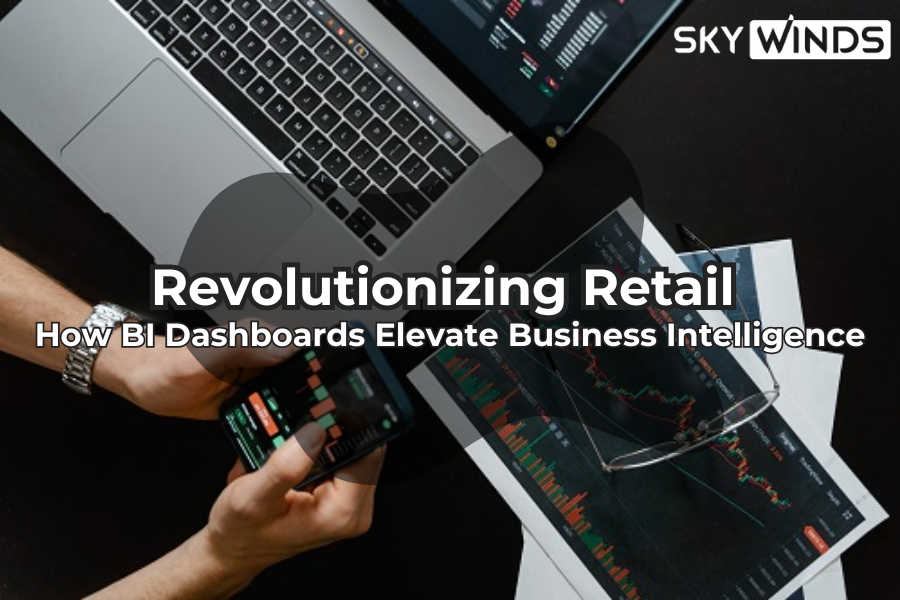A business landscape requires more than instinct to keep up with the game—it calls for data-driven decision-making as well. Retailers are increasingly looking at Retail Business Intelligence tools as a means to collect more meaningful insights, make operations more efficient, and improve customer experiences. Data visualization is the heart of this transformation, as retail business dashboards are now the most crucial instruments to present and evaluate data. In this blog, we will delve into how retail business intelligence solutions based on data analytics are revolutionizing the way retailers operate, and why retail sales dashboards have become a major trend in businesses of all sizes.
Table of Contents
- The Role of Retail Business Intelligence in Modern Retail
- What Are Retail Business Dashboards?
- How BI Dashboards Are Transforming Retail Business Intelligence
- Key Features of an Effective Retail Business Dashboard
- Real-world applications of Retail Business Dashboards
- Choosing the Right Retail Business Intelligence Solution
- The Future of Retail Business Intelligence
- Conclusion
The Role of Retail Business Intelligence in Modern Retail
The retail Industry is one of the richest in data sources containing sales transactions, customer touchpoints, and inventories, to maintain sources in a handful. But without the proper tools, this data remains unused. Retail Business Intelligence seems to be the field where the proper tools come into life. Through data analytics in the retail industry, retailers can find correlations, trends, and opportunities that without data analysis would have gone unnoticed.
Retail Business Intelligence solutions help retailers to Observe sales performance in real-time mode, Analyze customer behavior and likeness, Control proper inventory management, Discover market tendencies and predict demand, and Streamline operations.But, New technology for retail businesses like dashboards makes it look like there’s a new world without boundaries in retail.
What Are Retail Business Dashboards?
A retail Business dashboard serves as a centralized hub that reduces information from diverse origins and displays it in a readable and understandable visual layout. These dashboards offer a detailed summary of crucial KPIs and stats, allowing retailers to decide swiftly. For example, a retail sales dashboard display might show live sales details, the mean value of each sale, the incoming customers count, and how well each product is doing. By combining all this data into one easy-to-use system, retail owners can save time and improve their business by doing what counts.
How BI Dashboards Are Transforming Retail Business Intelligence
The union of retail business intelligence solution tools with retail business dashboards is transforming the sector. Here’s how:
1. Real-Time Data Access for Faster Decision-Making
In the retail industry, timing is the most important and everything. A retail sales dashboard Helps and provide owners see how well sales are going and act fast when store trends change. If a specific thing becomes popular, the retailer who sells can bring more of it to meet customer needs and demands.
2. Enhanced Customer Insights
Understanding customer behavior is critical for success in retail. Retail business dashboard tools look at details from loyal customers, shopping online, and in-store buys to make out customer profiles. These understandings assist retailers in customizing promotional activities, enhancing client happiness, and escalating allegiance. These understandings assist retailers in tailoring marketing campaigns, enhancing client contentment, and elevating loyalty.
3. Optimized Inventory Management
Overstocking and understocking are common challenges in retail. In the business, retailers can use data analysis to better guess what people will want and make sure they have the right amount of stuff ready. A retail business dashboard can monitor stock exchange frequencies, mark slow-moving goods, and suggest restock points, guaranteeing continuous availability of appropriate merchandise.
4. Improved Sales Performance
A Retail Sales Dashboard displays a noticeable view of buying and sales patterns and trends, leading item listings, and low-selling groups. Retailer folks can change prices, run special deals, and smartly use their tools better with this information effectively.
5. Streamlined Operations
Retail business intelligence Solutions help in organizing everything from how we get supplies, to when to schedule our employees. Dashboards show where work is not done well, keep an eye on staff work, and check how well suppliers work, assisting retailers in handling their business more efficiently.
6. Competitive Advantage
In a crowded market, gaining a competitive edge is crucial. Retailers use Retail Business Intelligence to spot new trends, compare with others, and stay ahead.
Key Features of an Effective Retail Business Dashboard
Not all dashboards are created equal. To change your retail management and operation system, your retail business dashboard control panel should have these:
Customizable Visualizations
Every retailer requires individual requirements and needs, making it crucial to opt for a dashboard providing adjustable graphical displays. Whether you appreciate bar graphs, pie charts, or temperature charts, the skill to customize your dashboard guarantees concentration on important stats.
Real-Time Data Updates
In the fast-paced retail environment, outdated information is of little use. A retail sales dashboard with real-time updates keeps you working with up-to-date and ensures with you the latest data.
Mobile Accessibility
With the increase of mobile tech, retailers require entry to their info and data on the go. A mobile-adapted retail business dashboard enables you to observe and see the results from virtually anywhere, whenever.
Integration with Multiple Data Sources
Retailers keep track of customer info from different places including point-of-sale systems, e-commerce platforms, and customer relationship management (CRM) tools. that help them manage their customers. A strong retail business intelligence solution must work well with different systems to give a complete picture of how your business is doing.
User-Friendly Interface
A dashboard is only as good as its usability. Look for a solution that comes with an intuitive layout, allowing users of varied expertise to navigate and understand analytics easily.
Real-world applications of Retail Business Dashboards
- Boosting Sales During Peak Seasons: A clothing fashion retailer used a retail sales dashboard to Boost and monitor store revenue during the holiday season. By identifying top-selling items and underperforming categories, the retailer was able to adjust its marketing strategy and increase overall sales by 20%.
- Reducing Inventory Costs: A supermarket chain set up a retail business dashboard to observe stock quantities in its branches. By checking how fast products are used and how long they last, the store cut down on throwing things away and saved more than $100,000 each year.
- Enhancing Customer Loyalty: A skincare corporation employed a retail business intelligence tool to examine buyer behavior trends. Beauty company employed commerce analysis service to assess client buying habits. After customizing the customer loyalty system to fit these findings, the brand experienced a 15% rise in people buying after installing the solution and analyzing the brand’s purchase pattern.
Choosing the Right Retail Business Intelligence Solution
Choosing an appropriate retail business intelligent solution can be demanding due to the abundance of choices. Here are a few tips to help you make the right choice:
Identify Your Needs
Start by identifying the key challenges you want to address. Are you looking to bolster sales efficiency, facilitate inventories, or increase customer understanding? Understanding your goals will aid in selecting a solution that corresponds with your requirements.
Evaluate Ease of Use A powerful dashboard is only effective if your team can use it. Look for a solution with a user-friendly interface and robust training resources.
Consider Scalability As your business grows, your data needs will evolve. Choose a retail business intelligence solution that can scale with your business.
Check Integration Capabilities
Ensure that the solution can integrate with your existing systems, such as your POS, e-commerce platform, and CRM.
Read Reviews and Case Studies: Seek reviews and analytical reports from different retailers to evaluate the success of the solution.
The Future of Retail Business Intelligence
As technology continues to evolve, so will retail business intelligence. Upcoming developments like AI, algorithm learning, and foresight modeling are poised to elevate data analysis in the retail industry. Shortly, we can expect retail business dashboards to become even more sophisticated, offering advanced features like:
- Predictive sales forecasting.
- AI-driven product recommendations.
- Automated inventory replenishment.
- Enhanced customer segmentation.
By keeping up with these trends, retailers can still use smart retail business intelligence solutions to help them grow and come up with new ideas.
Conclusion
As a growing business market, retail business intelligence has not become a requirement. Using retail business dashboards, retailers can acquire vital information to make intelligent choices, streamline processes, and provide superior customer service. What’s your next step in reinventing your retail business using data analysis? Begin investigating show-case transaction panels now to unleash the whole capacity of your info retail sales dashboards.




